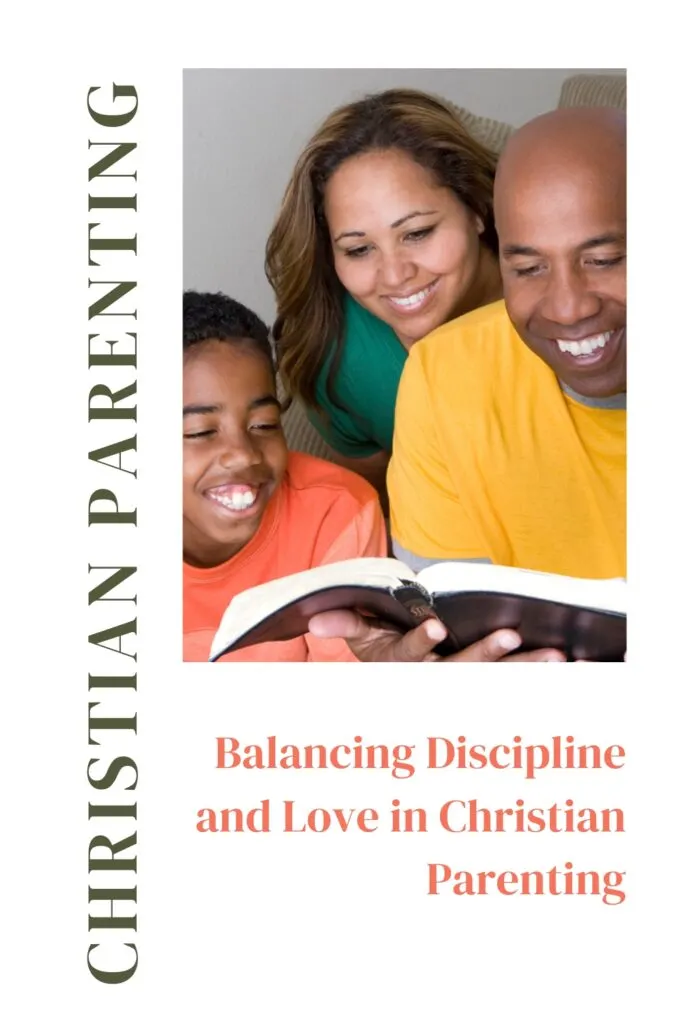This page/post may contain affiliate links. As an Amazon Associate, as well as an affiliate of other programs, this means if you purchase something using these links, I will receive a commission on qualifying purchases at no cost to you! For more detailed information, please visit our Affiliate Disclaimer page
Balancing Discipline and Love in Christian Parenting
As a Christian parent, I understand the importance of instilling discipline and love in my children’s lives. However, finding the right balance between the two can be challenging. On one hand, discipline is necessary to teach children right from wrong and to help them develop self-control. On the other hand, love is essential to build a strong relationship with our children and to show them the grace and forgiveness that God offers us.
We have a unique opportunity to raise our children in a way that honors God and reflects His love. We can teach them biblical values and principles that will guide them throughout their lives.
But how do we balance discipline and love in our parenting approach? How do we show our children that we love them unconditionally while also holding them accountable for their actions?
Biblical Instructions for Parents
Proverbs 13:24 says, “Whoever spares the rod hates their children, but the one who loves their children is careful to discipline them.” This verse reminds me that discipline is an integral part of parenting. However, as instructed in Scripture, biblical discipline should always be rooted in love and aim to teach and correct behavior.
Ephesians 6:4 also guides parents: “Fathers, do not provoke your children to anger by the way you treat them. Rather, bring them up with the discipline and instruction that comes from the Lord.”
This verse reminds me that my ultimate goal as a parent is to raise my children to know and love the Lord.
Prayer in Parenting
Prayer is also an essential part of my parenting in my household. I pray for my children’s safety, health, and well-being. I also pray for wisdom and guidance as I raise them. I believe that prayer is a powerful tool that can help me to be a better parent and to guide my children in the right direction.
Teaching Christian Values
As a parent who follows the Christian faith, I prioritize instilling faith-based principles in my children. This encompasses nurturing a love for God and fellow people, emphasizing the importance of honesty and integrity, and encouraging them to treat everyone with compassion and respect.
Forgiveness is another key value I teach – both in forgiving others and seeking forgiveness when they make a mistake.
Integrating faith in my parenting allows me to guide my children in a manner that aligns with honoring God and adhering to His teachings. I aspire to see them grow into devoted and strong individuals.
The Balance of Love and Discipline
Understanding Unconditional Love
I think most parents would agree with me when I say that unconditional love is the foundation of a healthy parent-child relationship.
Unconditional love, much like our Heavenly Father’s love for us, means that I cherish my child regardless of their actions. It means that I see my child as a unique individual with their strengths and weaknesses.
This is one of the most important partners in this article so I want to draw attention to it. It also means that I do not withhold love or affection as punishment.
The Role of Discipline
As much as love and guidance, discipline is essential to Christian parenting.
Discipline is not just about punishment but about teaching our children right from wrong. Discipline helps our children learn to make good choices and to take responsibility for their actions. Discipline should be rooted in love and compassion.
Achieving Balance
Navigating between love and discipline in parenting is no small feat, yet it’s pivotal for the wholesome growth of our children. My approach as a nurturing parent is to blend firmness with fairness in discipline. It’s about setting clear boundaries and expectations while also celebrating and reinforcing their positive choices.
Regarding corporal punishment, my stance aligns with a thoughtful, prayerful approach: it is a measure of last resort and never a result of anger or frustration, reflecting a balanced and compassionate Christian view. I prefer to employ consequences that are thoughtfully tailored to each situation, aiming to help my child grasp the repercussions of their actions.
Correcting my child’s behavior is always a delicate task. It’s crucial, yet never easy. My goal is to approach this with a heart full of compassion, guiding them to understand the inappropriateness of certain behaviors, not through harshness, but through a lens of empathy and understanding.
Setting Boundaries and Expectations
Guided by my Christian faith, I place great emphasis on setting distinct boundaries and expectations for my children. This approach goes beyond the realm of mere discipline; it is a tool for teaching them about the standards of acceptable behavior and the repercussions of their actions. Let me share my strategy for nurturing this understanding in my children:
Emphasizing Consistency
The cornerstone of effective boundary-setting is consistency. I strive to be steadfast in my disciplinary approach, ensuring that my children are clear about what is expected of them. For instance, if the rule is no dessert without finishing dinner, I always adhere to this.
This consistency reinforces the idea that actions have consequences and that rules are to be taken seriously.
Fostering Independence Through Participation
While setting boundaries is crucial, it’s equally important to nurture independence in our children. I aim to empower my children to make sound decisions on their own. One method I employ is involving them in the boundary-setting process.
For example, I might discuss with my child what they feel is an appropriate consequence for a certain action. This approach makes them feel more in control and instills a sense of responsibility for their actions.

Handling Mistakes and Misbehavior
Understanding that addressing bad behavior and mistakes is a fundamental part of parenting, I strive to guide my children with patience and scriptural wisdom.” We must respond with patience and understanding when our children make mistakes or misbehave.
Responding with Patience and Understanding
- Respond Calmly and Patiently: Avoid reacting in anger when children misbehave or make mistakes. Remember, they are still learning and growing.
- Emphasize Understanding: Instead of expressing frustration, seek to understand the reasons behind their actions.
- Use as Teachable Moments: Turn these instances into opportunities for learning, rather than just moments of correction.
Using Mistakes as Teachable Moments
We have a responsibility to teach our children right from wrong. When our children make mistakes, we should use it to teach them about responsibility and consequences.
We should explain why their behavior was wrong and what they can do to make it right.
We can also use mistakes as an opportunity to teach our children about mercy. We can show them that even when they make mistakes, we still love them and are willing to forgive them.
By doing so, we can teach them about the love and mercy of God.
Resources for Christian Parenting
Raising kids can be challenging; we all know that. That’s why I’ve found it helpful to seek guidance from trusted resources. Here are some of my favorite books, authors, and ministries that have helped me balance discipline and love in my parenting:
Influential Books and Authors
One author who has had a profound impact on my parenting is Dr. James Dobson. His book, “The New Strong-Willed Child,” offers practical wisdom on disciplining children without breaking their spirit. I’ve also found “Parenting with Love and Logic” by Foster Cline and Jim Fay to help teach my kids responsibility and self-discipline.
Another book that I highly recommend is “Grace-Based Parenting” by Dr. Tim Kimmel. This book has helped me understand how to extend grace to my children while still maintaining boundaries and discipline. I’ve also found “Shepherding a Child’s Heart” by Tedd Tripp to be a valuable resource for teaching my kids about God’s love and character.
The form you have selected does not exist.
Parenting Ministries and Speakers
In addition to books, I’ve also found it helpful to attend parenting conferences and seminars. One ministry that I highly recommend is Focus on the Family. They offer a wealth of resources for Christian parents, including podcasts, articles, and books. I’ve also found it helpful to listen to parenting speakers like Michael Smalley, who offers practical advice on how to balance love and discipline in our parenting.
Ultimately, as Proverbs 22:6 tells us, it’s our responsibility as parents to train up our children in the way they should go. By seeking wisdom and guidance from trusted resources, we can fulfill this calling with grace and love.

Krystal DeVille is an avid believer in the power of education, particularly in STEM fields. She is a dedicated homeschool mom to three amazing children and the founder of STEM Education Guide and KinVibes. Her mission is to make science, technology, engineering, and mathematics accessible to everyone by providing resources for teachers, parents, and students alike.
ESV – “Scripture quotations are from The ESV® Bible (The Holy Bible, English Standard Version®), copyright © 2001 by Crossway, a publishing ministry of Good News Publishers. Used by permission. All rights reserved.”


